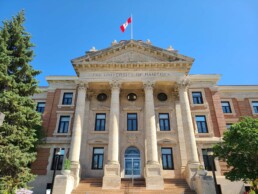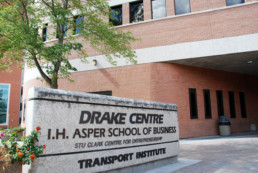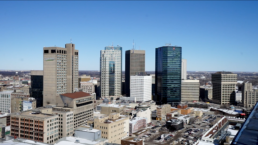The University of Manitoba campuses are located on original lands of Anishinaabeg, Cree, Oji-Cree, Dakota, and Dene peoples, and on the homeland of the Métis Nation. We respect the Treaties that were made on these territories, we acknowledge the harms and mistakes of the past, and we dedicate ourselves to move forward in partnership with Indigenous communities in a spirit of reconciliation and collaboration.
Founded more than 140 years ago and located in the heart of the country, The University of Manitoba is Western Canada’s first university. As the region’s largest and only research intensive university, we offer over 100 academic programs, with professional disciplines such as medicine, law and engineering to name a few. Our energetic university community consists of almost 30,000 students, more than 8,900 faculty and staff, and 138,000 alumni in 137 countries. Over 16 percent of our current students are international, representing 115 countries across the globe.
The University of Manitoba campuses are located on original lands of Anishinaabeg, Cree, Oji-Cree, Dakota, and Dene peoples, and on the homeland of the Métis Nation. We respect the Treaties that were made on these territories, we acknowledge the harms and mistakes of the past, and we dedicate ourselves to move forward in partnership with Indigenous communities in a spirit of reconciliation and collaboration. The University of Manitoba is home to a thriving community of Indigenous researchers, staff and more than 2,000 First Nations, Metis and Inuit students, including more than 3,580 graduate students — one of the largest Indigenous student bodies in the country.


For more than 80 years, the I.H. Asper School of Business has provided a world-class education to leaders and innovators who contribute ethically to the social and economic well-being of Manitoba and the world. Located in Winnipeg, Manitoba, Canada – the heart of North America – the Asper School offers an enriching student experience inside and outside the classroom. Students at the Asper School feel as though they are more than students at a school; they feel part of a larger, global community. Outside the classroom, international exchanges, the Co-Op Program, and our award-winning Commerce Students Association are all part of the engine that enables students to achieve success.
The Asper School is accredited by the Association of Advanced Collegiate Schools of Business (AACSB), one of the highest standards of achievement for business schools worldwide. The Asper School of Business is housed in the Drake Centre. The Centre features the Arni Thorsteinson and Susan Glass Student Commons, a large central atrium, brings natural light to all corners of the building. This is where you’ll find all classrooms, offices and facilities belonging to the Asper School of Business.
The Stu Clark Graduate School is located within the Asper School of Business and is home to the Asper MBA, Master of Finance, Master of Science, and PhD programs.
The Asper School of Business is excited to host the first-ever Virtual JDC West in 2021, and welcome JDC West participants to the first-ever JDC West in Winnipeg in 2022.
The City of Winnipeg
Vogue calls Winnipeg, “an absolute must-visit destination,” while National Geographic has listed it as “one of the best trips on earth.” With world-class performing arts, an incredible culinary scene and attractions that include polar bears swimming overhead and an architectural marvel that celebrates human rights, Winnipeg keeps moving from the centre of the continent to the centre of attention.
The Forks has an incredibly unique public market along with the world’s most stylish – and longest – skating trail along the Assiniboine and Red Rivers, a trail that will be open in Winter 2021 during JDC West. Performances from Canada’s Royal Winnipeg Ballet, the Winnipeg Symphony Orchestra and Royal Manitoba Theatre Centre enchant, while so much of the city is awash with gorgeous parks and elm-canopied neighbourhoods.
Just on the horizon we have the Winnipeg Art Gallery’s $65-million Inuit Art Centre – which will house the world’s largest collection of contemporary Inuit art and Canada’s Diversity Garden – a massive $75 million horticultural attraction that celebrates humanity’s history with plants. Close to 62 percent of Manitoba’s population lives within Winnipeg’s census metropolitan area of 811,874 inhabitants, so Winnipeg dominates the provincial economy in a way few other Canadian cities do. Winnipeg has always been economically strong and diverse. We have nurtured a robust workforce that is skilled, talented and productive.
Winnipeg is also home to The Canadian Museum for Human Rights, Canada’s first national museum located outside of the Capital and the first museum solely dedicated to the evolution, celebration and future of human rights.

